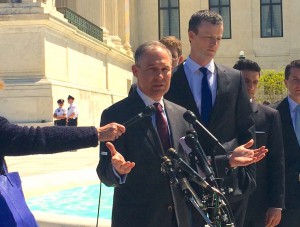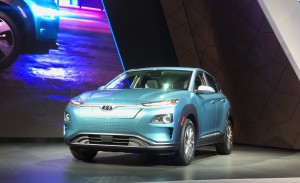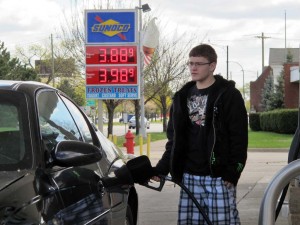In a widely expected move, Trump EPA Administrator Scott Pruitt has confirmed the agency will roll back the current Corporate Average Fuel Economy standards, though by how much is not yet clear.
The news was largely hailed by the auto industry, which had challenged the 54.5 mpg target it initially agreed to under the Obama Administration. But the announcement drew significant criticism from consumer groups, environmentalists and, in particular, California regulators. Under current Clean Air standards, that state has the right to set its own standards which are normally even tougher than the EPA rules. But Pruitt signaled his intention of revoking that authority, something likely to touch off a legal battle that could delay any steps the EPA takes.
“The Obama EPA’s determination was wrong,” Pruitt said in a statement Monday. “Obama’s EPA cut the midterm evaluation process short with politically charged expediency, made assumptions about the standards that didn’t comport with reality and set the standards too high.”
(Click Here to check out the dozen best debuts at the 2018 NY Auto Show.)
The Corporate Average Fuel Economy, or CAFE, standards were first enacted in 1975, a response to the first of the era’s two Mideast oil shocks. The guidelines went largely untouched from the mid-1980s through the beginning of the Obama Administration. Then, two increases were enacted, both with the approval of the auto industry. The current rules call for a rapid increase to an official target of 54.5 mpg by 2025, though due to various credits and adjustments, the actual target is in the low to mid-40 mpg range.
Prior to a “mid-term review” begun in 2016, a number of automakers began to challenge that target, insisting that it would lead to a rapid run-up in vehicle pricing and a sharp decline in sales. Former Ford CEO Mark Fields told then-new President Donald Trump a year ago that CAFE could cost a million U.S. jobs. Industry leaders also faulted the review process that saw the EPA declare, just before the change in administrations, that the standards would remain in effect.
“This was the right decision, and we support the administration for pursuing a data-driven effort and a single national program as it works to finalize future standards,” the Alliance of Automobile Manufacturers said in a statement. The group, which represents some of the industry’s largest car companies, said it did accept the idea of increasing fuel economy, as long as the final results “keep new vehicles affordable to more Americans.”
But reaction among CAFE proponents was quick – and fierce.
“EPA’s decision defies the robust record and years of review that show these targets are reasonable and appropriate,” David Friedman, director of cars and products policy and analysis for Consumers Union.
“American families cannot afford to spend more money at the pump,” echoed Jack Gillis, author of The Car Book, an annual automotive buyer’s guide and a director with the Consumer Federation of America. “They do not deserve to be saddled with gas-guzzling vehicles that will wreak havoc on their household finances when gas prices inevitably spike again.”
The EPA did not lay out a specific new set of rules, instead saying a new review process will now get underway. That includes the California waiver which “is still being” the agency said.
“Cooperative federalism doesn’t mean that one state can dictate standards for the rest of the country,” Pruitt said in a statement. “It’s in everyone’s best interest to have a national standard, and we look forward to working with all states, including California, as we work to finalize that standard.”
Prior to Monday’s announcement, Mary Nichols, the head of the California Air Resources Board, said she would be open to consider changes to CAFE, but also indicated she saw no reason for a rollback. CARB is widely expected to fight any effort to eliminate its waiver which was first enacted in 1970.
And that, along with other legal actions, could tie up any changes the EPA winds up making for some time. If California ultimately were to retain its waiver a rollback could prove to be little more than a Pyrrhic victory, some observers are suggesting. Another 11 states now follow the California standards and, collectively, they represent more than a quarter of annual U.S. auto sales. As is currently the case, automakers will find it difficult – and costly — to develop two different classes of vehicles, one to meet the EPA’s lower target and the other to comply with California’s standards.
In fact, there are other challenges that could prevent automakers from enacting a wholesale reduction in fuel economy targets: the fact that emissions and mileage standards are, if anything, being tightened rapidly in most other markets, notably including China were new regulations are pushing manufacturers to roll out a flood of new battery-based vehicles.
Even with a rollback, Nissan CEO Carlos Ghosn last year told TheDetroitBureau.com he didn’t expect to change the automaker’s long-term fuel economy strategy. A senior Honda official, talking on background, took the same position, not only pointing to what is happening globally but also noting that the Japanese automaker would be reluctant to shift direction only to see a new, Democratic administration come in three years from now and again toughen CAFE, forcing a costly reversal.
If anything, several senior Detroit manufacturers have said they would more likely shift model mix strategies than abandon efforts to develop more fuel efficient vehicles. A rollback would allow them to sell more muscle cars, such as the 707 horsepower Dodge Challenger Hellcat, for example, or V-8 versions of the Ford F-150 pickup.
(Luxury automakers shift focus on plug-in hybrids to performance. Click Here for more.)
But, if anything, there are no indications current plans to develop more electrified vehicles – such as the 23 all-electric models GM has promised by mid-decade – will be scrapped.
Automakers are well aware that despite relatively affordable gas prices consumers continue to list fuel economy as a key factor in buying decisions. And a sudden surge in fuel costs could prove disastrous for those manufacturers that did make significant cutbacks in mileage, analysts warn.
(Tesla facing growing crisis, stock plunge. Click Here for more.)



